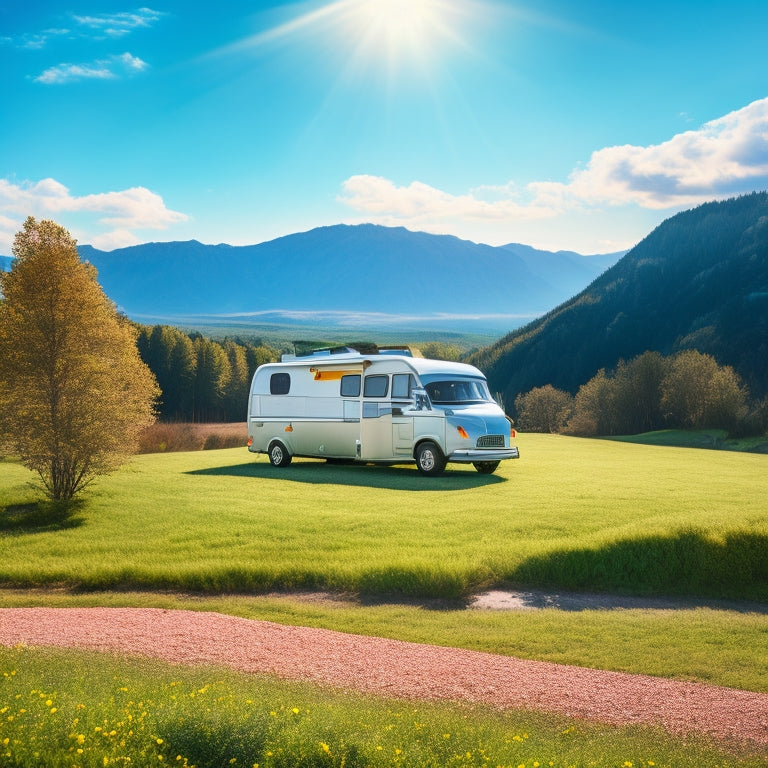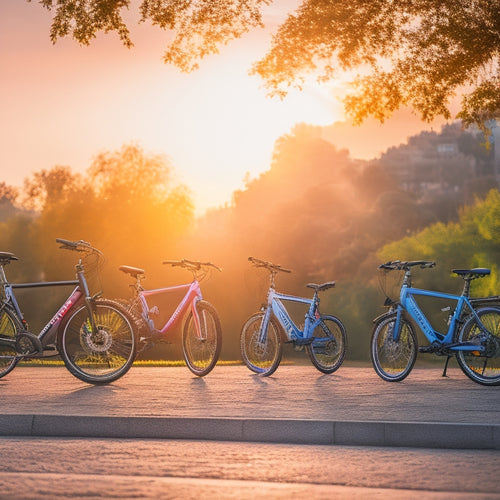
Solar Panel Costs for RVs and Campervans Revealed
Share
You'll likely spend between $1,000 and $5,000 or more on a solar panel system for your RV or campervan, depending on your specific energy needs, installation complexity, and performance expectations. Warranty options, industry trends, and material efficiency all impact pricing. You'll need to take into account appliance usage, battery capacity, travel style, and climate to determine the right system size and battery costs for your needs. Installation costs vary depending on complexity, professional expertise, and roof topology. Now, get ready to delve deeper into the details that'll help you make an informed decision for your adventure on wheels.
Key Takeaways
• Solar panel costs for RVs and campervans vary based on warranty options, industry trends, and material efficiency.
• Installation costs depend on system complexity, professional expertise, and roof topology, with wiring complexity driving up costs.
• System size and battery capacity impact energy independence, with a balance needed between cost, weight, and energy needs.
• DIY installation can be cost-effective, but professional installation ensures a safe and efficient system, with a hybrid approach offering a compromise.
• Custom solutions are available for specific RV and campervan needs, with factors like appliance usage, travel style, and climate conditions influencing the ideal system.
Understanding Solar Panel Pricing
As you explore the world of solar panels for your RV or campervan, understanding the pricing structure is essential, and it all begins with identifying the key factors that influence the cost of these eco-friendly energy solutions.
You're probably wondering why some solar panels cost an arm and a leg, while others seem like a steal. Well, it's not just about the brand name or quality; it's about the warranty options, industry trends, and a few other essential factors.
Warranty options, for instance, play a significant role in determining the cost of solar panels. A longer warranty period usually means a higher upfront cost, but it also gives you peace of mind and protection against defects or malfunctions.
On the other hand, industry trends, such as the shift towards more efficient and durable materials, can drive up costs but also provide better performance and longevity.
RV and Campervan Solar Needs
When equipping your RV or campervan with solar panels, you need to take into account your unique energy requirements, which depend on factors like your travel style, appliance usage, and battery capacity. If you're a digital nomad living the Boondocking Lifestyle, you'll need more power to keep your devices charged and your lights on.
On the other hand, if you're a casual camper who only uses their RV for weekend getaways, your energy needs will be much lower.
To determine your solar needs, consider the following factors:
-
Appliance usage: How many appliances do you plan to power with your solar panels? Think laptops, lights, fridges, and air conditioners.
-
Battery capacity: What's the capacity of your deep cycle batteries, and how often do you plan to charge them?
-
Travel style: Do you prefer Remote Camping in the wilderness or sticking to developed campsites with hookups?
-
Climate: Will you be camping in sunny California or cloudy Washington state?
-
Energy efficiency: Are you using energy-efficient appliances and light bulbs to reduce your power consumption?
Installation Costs and Factors
You'll need to factor in the cost of installation, which can vary widely depending on the complexity of your system and the professional expertise required to get it up and running. Installation costs can range from a few hundred bucks to several thousand dollars, so it's important to get a clear estimate before diving in.
One significant factor affecting installation costs is your RV's roof topology. If your roof is a maze of vents, antennas, and skylights, installation will be more complicated and expensive. Similarly, wiring complexity can drive up costs. If your system requires extensive rewiring or custom connections, be prepared for a higher bill.
To get an accurate estimate, consider consulting with a professional solar installer who can assess your RV's unique needs. They'll be able to provide a detailed quote that includes all the necessary components, labor, and any additional work required to get your system up and running smoothly.
System Size and Battery Costs
Your solar panel system's size and battery capacity directly impact your RV's energy independence. Larger systems and higher-capacity batteries allow you to boondock for extended periods without worrying about power outages. But, bigger isn't always better - you need to balance your energy needs with the cost and weight of the system.
Here's a breakdown of what you can expect to pay for different system sizes and battery capacities:
-
Small System (100-200W, 100-200Ah battery): Ideal for casual campers, these systems provide basic energy efficiency and cost around $800-$1,500.
-
Medium System (200-400W, 200-400Ah battery): Suitable for regular boondockers, these systems offer moderate energy independence and cost between $1,500-$3,000.
-
Large System (400-600W, 400-600Ah battery): Perfect for full-time RVers, these systems provide high energy independence and cost around $3,000-$5,500.
-
Extra-Large System (600-800W, 600-800Ah battery): Ideal for extreme boondockers, these systems offer maximum energy independence and cost between $5,500-$8,000.
-
Custom System: If you need a bespoke solution, be prepared for a cost breakdown that's tailored to your specific energy needs.
DIY Vs Professional Installation
Now that you've determined the ideal system size and battery capacity for your RV, it's time to decide who's going to get the job done - you or a professional. This decision can greatly impact your wallet and the overall success of your solar panel installation.
| Option | Pros | Cons |
|---|---|---|
| DIY Installation | Cost-effective, sense of accomplishment | Lack of expertise, potential safety risks, voids warranty |
| Professional Installation | Expertise, warranty coverage, local permits handled | Higher upfront cost, dependence on installer's schedule |
| Hybrid Approach | Cost-effective, some professional guidance | Limited expertise, potential mistakes |
If you're comfortable with heights and electrical work, DIY installation might be the way to go. However, if you're not sure about local permits or want the security of warranty coverage, hiring a professional is the better choice. The hybrid approach is a good middle ground, but be cautious not to bite off more than you can chew. Whichever route you choose, make sure you're prepared for the challenges and responsibilities that come with it.
Frequently Asked Questions
Can I Use Solar Panels on a Fiberglass or Pop-Up Camper Roof?
You're wondering if solar panels will work on your fiberglass or pop-up camper roof? Well, it depends on roof durability and camper weight - if your roof can handle the extra load, you're good to go!
Will Solar Panels Drain My RV Batteries at Night?
"You're wondering if solar panels will drain your RV batteries at night? Relax, they won't! Your Deep Cycle batteries are designed to store excess energy for nighttime use, and their capacity will only be drawn upon when needed."
Can I Add More Solar Panels to My Existing System Later?
'You can definitely add more solar panels to your existing system later, making it easy to scale up for future upgrades - just make sure your system's designed for expansion and can handle the extra power!'
Do I Need a Special Permit to Install Solar Panels on My Rv?
"You'll need to check local regulations and zoning laws, buddy, to see if a special permit is required to install solar panels on your RV - don't assume it's a free pass, or you might get zapped with fines!"
Can I Use Solar Panels to Power My Rv's Air Conditioner?
"Hey there! You're wondering if solar panels can power your RV's air conditioner? Unfortunately, it's unlikely, as ACs require a lot of energy. You'll need alternative power sources for that, focusing on energy efficiency to reduce your overall power needs."
Related Posts
-

Find Your Eco-Friendly Motorcycle for a Sustainable Ride
You're shifting gears towards a more sustainable ride, opting for an eco-friendly motorcycle that combines thrill wit...
-

Sustainable Commuting: Top Daily Use Electric Bicycles
You're looking to trade in your gas-guzzling vehicle for a more sustainable option, and a daily use electric bicycle ...
-

Why Go Solo in Urban Transportation?
You're taking control of your daily commute by ditching the crowds and going solo, and that's a smart move. By choosi...


